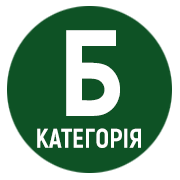PECULIARITIES OF ETHICAL MARKING OF GOODS
Abstract
The purpose of the study is to determine the features of ethical marking, characterization of its main types, analysis of the level of use of this type of marking in countries of the world and prospects of its use in Ukraine. The object of the study is ethical marking, in partucular informational signs that confirm certification according to ethical requirements. The general approach to determining the content and structure of the study is based on a systematic analysis method. Methods of analysis and synthesis, induction and deduction, abstraction and grouping were used to summarize the results. Ethical marking is a significant factor of influence in modern manufacturing and trade. Informational signs certifying the ethics of a product are conditionally divided into three broad groups: people and values; preserving the environment and sustainability of development; animal well-being. Despite the rather convincing advantages, there are a number of problems that complicate the use of ethical marking. In particular, the large number of marking signs overburdens consumers who are unable to distinguish “ethical” goods from all other. There are also a large number of products with falsified marking on the market that is not endorsed by any organization. The lack of effective control generates consumers distrust in this type of marking. Modern marking of goods is aimed at raising the level of consumers awareness and changing their purchasing behavior patterns, in particular the formation of conscious ethical consumption. Motivation, understanding and use of ethical labels are influenced by demographic characteristics, human values and differences among countries. In Ukraine, unfortunately, ethical marking is virtually not used. Both consumers and manufacturers are not interested in this aspect of trade, however Ukrainian manufacturers use ethical marking mostly for exported products.
References
2. Галик І. Зарубіжний досвід екомаркування товарів / І. Галик, Б. Семак // Товари і ринки. – 2013. – № 1. – С. 159-164.
3. Царук І. Українські реалії маркування еко-логічно чистих товарів / І. Царук, Ю. Шпильова // Вісник ЖДТУ. – 2016. – № 4(78). – С. 192-201.
4. Klaus G. Grunerta, Sophie Hiekeb, Josephine Willsb. Sustainability labels on food products: Consumer motivation, understanding and use. / Food Policy // 2014. Volume 44, February. – P. 177-189.
5. Bissinger K., Leufkens D. Ethical food labels in consumer preferences / British Food Journal // 2017. – Vol. 119. – № 8. – P. 1801-1814.
6. Daleen Magdalena Van der Merwe, K. Venter. A consumer perspective on food labelling: Ethical or not? Кoersjournal. – 2010. – Vol. 75 №. 2.
7. Nesiba Jiří, Čuhlova Renáta. Ethical Labels in Food-Industry within EU and China. Scientia et societas: časopis pro spoločenské vědy a management. Praha: Newton College. – 2019. – 15(1). – S. 54-64.
8. Передрій О. І. Особливості сертифікації продуктів харчування відповідно до стандартів “халяль” / О. І. Передрій // Товарознавчий вісник. – 2017. – Вип. 10. – С. 137-143.
9. Ethical labels [Електронний ресурс]. – Ре-жим доступу : https://www.euromonitor.com/ethical-labels.
10. Ethical Fashion Certifications and Standards: What Do the Labels Mean? – [Електронний ресурс]. – Режим доступу : https://goodonyou.eco/ethical-fashion-certifications-explained/.
11. Передрій О. І. Екологічна сертифікація як інструмент “зеленої” економіки / О. І. Передрій // Товарознавчий вісник : збірник наукових праць Луцького НТУ. – 2018. – Вип. 10. – С. 125-132.



